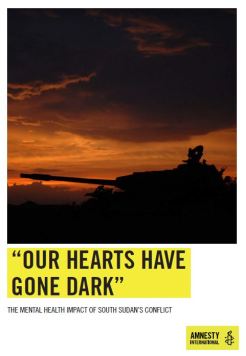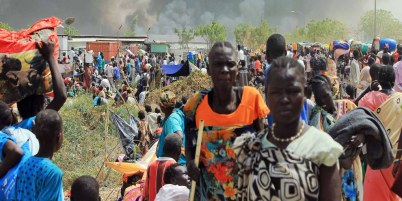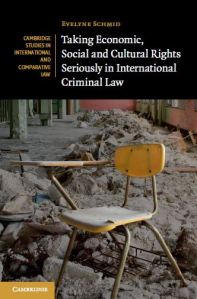It is trite to say that conflicts and health (care) are antithetical. In addition to the direct harm to health resulting from the violence, conflicts generally decrease the resources available for public health and often exacerbate discrimination in the enjoyment of the right to health. The relationships betwe en conflicts and mental health tend to be less visible than those related to physical health, but no less acute.
en conflicts and mental health tend to be less visible than those related to physical health, but no less acute.
Earlier this month, Amnesty International published the report, ‘Our hearts have gone dark’: The mental health impact of South Sudan’s conflict. In AI’s words, the report ‘documents the psychological impact of mass killings, rape, torture, abductions and even a case of forced cannibalism, on the survivors and witnesses of these crimes’. South Sudan is engaged in a non-international armed conflict between the South Sudan People’s Army under the control of the President and an armed opposition group. Based on interviews with 161 victims of and witnesses to human rights violations, as well as mental health professionals, government and UN officials, and representatives of non-governmental organizations, AI reveals a dire lack of mental health services across the country for people in need of support and care.
Despite the vast literature on the right to health in international human rights law (see, e.g. by Katherine H. A. Footer and Leonard S. Rubenstein, by Amrei Müller or by Pierre Perrin), it is still rare that human rights organisations provide rights-based analyses on health in conflicts in general, and on mental health in particular. As far as Amnesty International is concerned, this is the organisation’s first report specifically addressing mental health. Hence, it is very encouraging that Amnesty International is focusing on these neglected aspects of the conflict in South Sudan.
In this post, I take the opportunity to review two conceptual aspects of the report that I find particularly interesting:
- Harm to mental health: more than a consequence of conflict
First, the title of the report suggests (at least at first sight) that harm to mental health is primarily an impact of the conflict but not a violation itself. Harm to mental health is undisputedly – and sadly – a far too widespread consequence of many abuses of the conflict. But in light of the qualitative research documented in the report, many instances of harm to mental health do not seem to constitute ‘just’ a consequence of the conflict, but the primary intention of perpetrators. The report, for instance, documents shocking cases of government soldiers allegedly forcing people to eat human flesh and to disembowel dead bodies in exchange for their life. In such horrific examples, the infliction of mental pain and suffering is the violation itself and not an impact of other abuses. Such abuses constitute international crimes in certain circumstances, such as war crimes, torture or crimes against humanity. In the text of the report itself, Amnesty International qualifies the commission and the failure to address these deliberate acts as a violation of the respect and protect the right of the South Sudanese population to the highest attainable standard of health (chapter 6, p. 49).
As discussed elsewhere in an article with Aoife Nolan, there is a tendency in the literature to analyse economic and social rights such as the right to health not as part and parcel of past violations but from the perspective of consequences of other abuses. In other words, when economic and social abuses are considered, they are sometimes not analysed on their own terms, but rather as a secondary consequence of civil and political rights violations. This underscores the tendency to view civil and political rights abuses as the forefront issues when discussing human rights and conflicts, with economic and social rights abuses constituting their context and consequences. Remnants of such an approach can still be found in Amnesty’s new report, e.g. where the NGO points out that
‘acts such as torture, sexual violence, and unlawful killing will often have a negative impact on the mental health of “victims” (…). In addition to being serious violations of civil and political rights in and of themselves, such acts can, therefore, also constitute violations of the right to health.’ (Emphasis added).
While entirely correct, the section outlining the relationship between the violence and the right to mental health could have started much more strongly, e.g. by explaining how some of the documented acts deliberately target people’s mental well-being. Soldiers forcing someone to drink the blood of other victims trigger the State’s responsibility for a violation of the right to mental health independent of whether or not there are also violations of civil and political rights involved in such acts.
2. The right to mental health: not just a reparations issue
Second, and here I entirely agree with the legal framing, Amnesty does not exclusively frame the need to provide for mental health services from the angle of the right to reparations. While the link between mental health and reparations features prominently in the report (as this is often the case when economic or social rights are discussed in relation to violent conflicts), Amnesty International convincingly goes beyond this approach. The NGO appropriately frames the right to mental health care services as part of victims’ right to reparations as ‘an additional specific obligation’ – in addition to the primary obligation of refraining from and preventing acts that case psychological harm. This is important because an exclusive focus on mental health services as a form of reparations would seem legally unjustified given what I argued above.
On a side note, Amnesty’s approach to emphasise that the state has a basic obligation to refrain from and prevent acts that harm mental health finds support in concluding observations of the UN Committee on Economic, Social and Cultural Rights. Although South Sudan is not (or not yet?) a state party to the UN Covenant on Economic, Social and Cultural Rights, it is interesting that mental health is one of the few substantive issues on which the Committee has made specific statements tailored to conflict situations (for other issues and more analysis, see my article in the Netherlands Quarterly of Human Rights). It did so for the first time in 1997 when examining the report from Iraq, urging the Iraqi authorities to submit ‘concrete and comprehensive information on measures taken or foreseen in order to address the psychological and emotional problems affecting children after years of armed conflict’. More recently, the Committee recommended to Nepal and Cambodia that a higher priority be accorded to mental health care in relation to persons affected by the conflict. In 2010, the Committee also recommended that Afghanistan, if necessary, seek international cooperation to address conflict-related traumatic disorders.
Photo credit: Amnesty International, Justin Lynch/AFP/Getty Images




 manuscript on international crimes and violations of economic, social and cultural rights. Much has been written in the blogosphere about problematic issues of the judgment against Germain Katanga (such as the recharacterisation of charges and the interpretation of the policy requirement for crimes against humanity). See e.g.
manuscript on international crimes and violations of economic, social and cultural rights. Much has been written in the blogosphere about problematic issues of the judgment against Germain Katanga (such as the recharacterisation of charges and the interpretation of the policy requirement for crimes against humanity). See e.g.  ay at first sight seems of marginal value to the lawyers involved in determining what abuses deserve what kind of attention. At a closer look, ‘ordinary’ household items or a chicken can be of important practical value. Victims might desperately need their household utensils to carry drinking water from the well or the theft of livestock may have deprived victims of their only sources of protein.
ay at first sight seems of marginal value to the lawyers involved in determining what abuses deserve what kind of attention. At a closer look, ‘ordinary’ household items or a chicken can be of important practical value. Victims might desperately need their household utensils to carry drinking water from the well or the theft of livestock may have deprived victims of their only sources of protein.